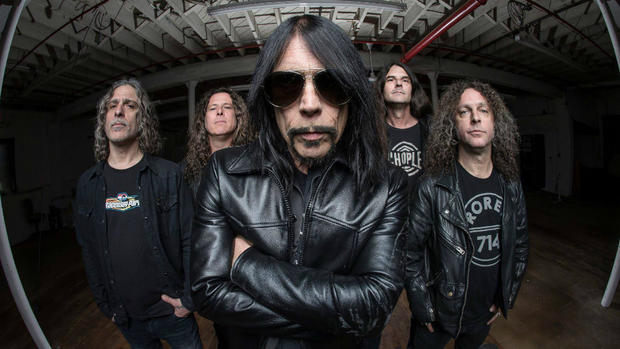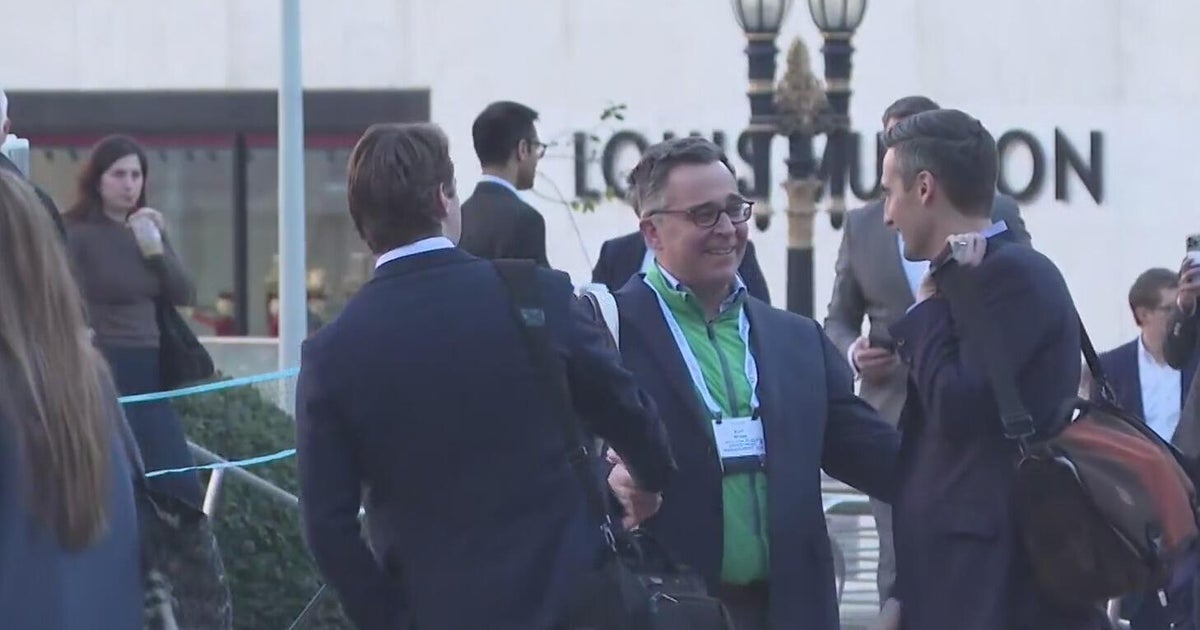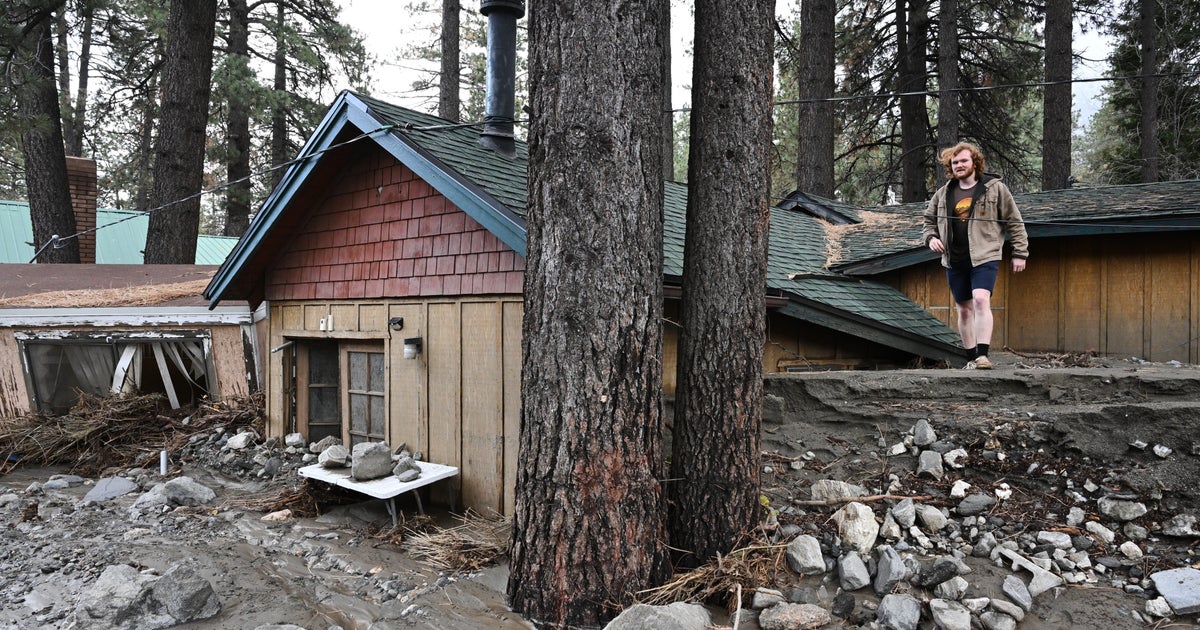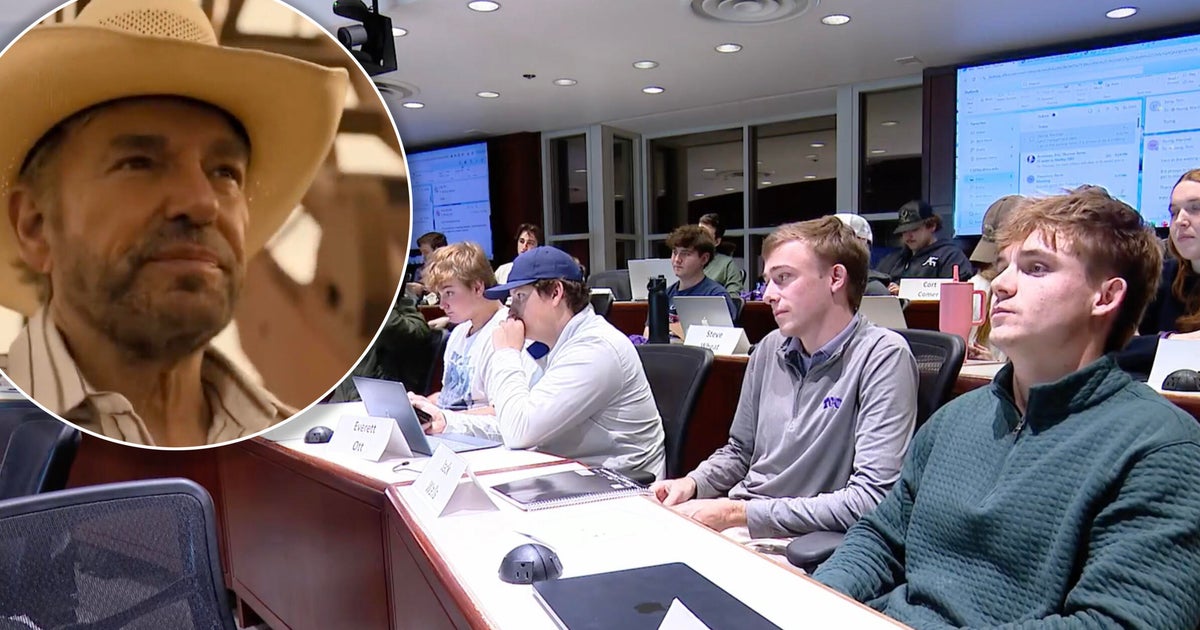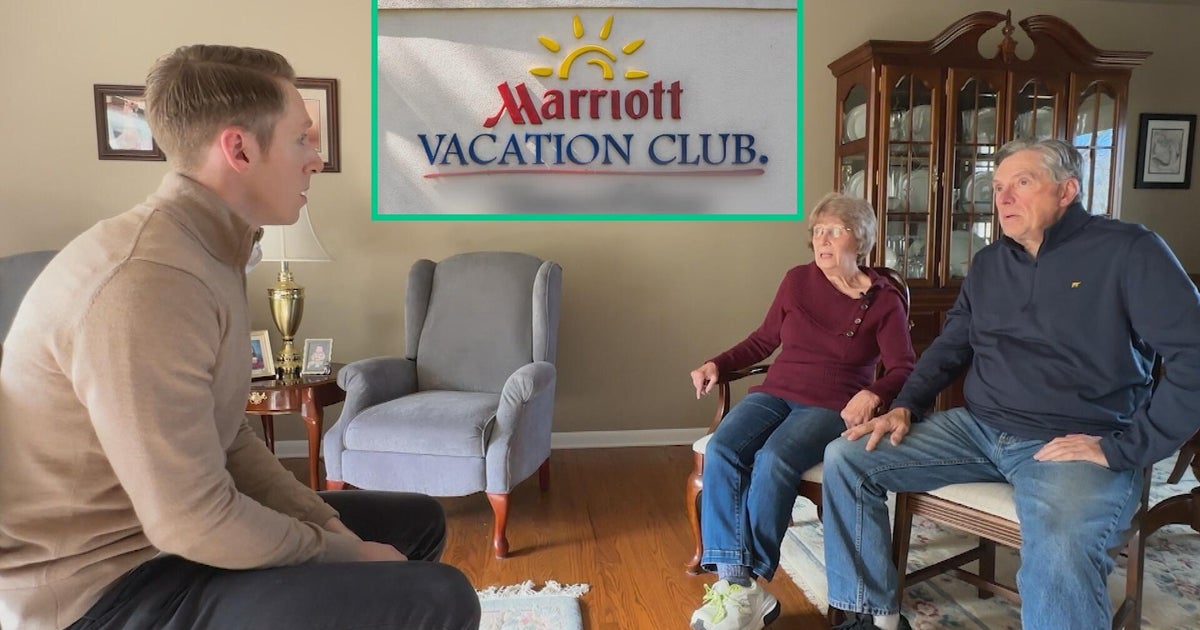CBS SF Talks To Monster Magnet's Dave Wyndorf
By Dave Pehling
SAN FRANCISCO (CBS SF) -- Along with down-tuned desert rockers Kyuss, New Jersey space-metal outfit Monster Magnet helped codify the stoner-rock template with their landmark efforts in the early 1990s. Led by visionary singer/guitarist Dave Wyndorf, the band filled out by original guitarist John McBain and drummer Tim Cronin had developed its unique throwback sound over several demos and singles leading up to its blown-out, hyper distorted debut EP for Glitterhouse Records in 1990.
But it was the monolithic, acid-damaged riffs heard on the band's far more lysergic follow-up EP Tab and it's ferociously psychedelic 1992 debut Spine of God that showed how much the band had refined its Hawkwind-meets-Cactus attack. Critical praise heaped on those efforts helped establish the group as an underground force and -- despite Wyndorf's penchant for subversive slogans like "It's a Satanic drug thing...you wouldn't understand" printed on the album's inner sleeve -- drew the attention that eventually got them signed to a major label.
While their A&M Records debut Superjudge didn't become a huge commercial hit, it still fortified their reputation as a powerhouse band evoking the psychedelic '60s and the raging proto-punk of the early '70s in equal measure. The band scored a minor hit with the tune "Negasonic Teenage Warhead" on 1995's Dopes to Infinity, but it wasn't until Wyndorf dialed down the psychedelic element on the band's 1998 commercial breakthrough Powertrip that they hit the charts and garnered serious radio and MTV airplay with "Space Lord" and the album's title track.
Monster Magnet struggled in the early 2000s as Wyndorf battled prescription-drug addiction and the band's relationship with A&M Records ended following the release of God Says No after there were issues with the album's promotion. Wyndorf and the band had something of a comeback with Mastermind in 2010, marking the first time Monster Magnet made the charts since Powertrip and also serving as the final album to feature longtime guitarist Ed Mundell.
On more recent efforts, Wyndorf and company have mined a psychedelic vein of spacey hard rock on The Last Patrol in 2013 and a pair of remix/re-imagined versions of those last two albums that added new songs and rearranged others, pushing the music into otherworldly territory. Earlier this year, Monster Magnet delivered its first album of entirely new songs in eight years with Mindf--ker, released on Napalm Records last March.
A bracing return to the kind of lean, propulsive rock anthems that made Powertrip such a huge smash, Wyndorf and the band unleash a potent collection of pounding, tuneful tracks that hearken back to the golden era of early '70s hard rock and proto punk. The current touring current line-up of the group featuring Wyndorf backed by longtime guitarist Phil Caivano, veteran MM drummer Bob Pantella, bassist Jim Baglino and returning guitarist Ed Mundell has hit the road for Monster Magnet's most comprehensive run of tour dates since the release of Last Patrol. Ahead of the band's first Bay Area appearance in almost five years at Thee Parkside on Friday, Oct. 12 (as well as a set at Aftershock in Sacramento this Saturday), CBS SF spoke to Wyndorf about his musical and lyrical inspirations for the album, his abiding love for the classic sound of Detroit rock and the difference between dumb being the new smart and keeping it simple, stupid.
CBS SF: You've talked about Mindf--ker being a return to more straight-ahead rock after the psychedelic sounds of Mastermind, The Last Patrol and the reinterpretations of those two albums. You've drawn a lot of inspiration from Detroit's holy trinity of the MC5, the Stooges and Alice Cooper, even though he isn't always associated with Detroit...
Dave Wyndorf: For sure. I don't have to go to far in my head. All I had to do was not emphasize a couple other influences, mostly the British influences. All I had to do was not go there, and everything else just falls into place. For my music, I'm pretty informed by '60s American garage rock and garage psych, early '70s British and American rock music, specifically Detroit American rock music. And that's fine for me. That's enough of a well for me to go to for the rest of my life.
CBS SF: The fact that you put this album out and that another band that touches on that sound as well -- the Hellacopters -- is out and touring again gives me some hope...
Dave Wyndorf: I know! I can't believe they're back! Those guys are total devotees. They are true believers.
CBS SF: Was there any particular album by those acts that you used as a touchstone for the new music as you were writing it?
Dave Wyndorf: Not a specific album. It's just a thing. It just kind of of comes to me while I'm playing. Every once in a while there will be a song that comes to me, but then I try to avoid it. I mean, there's only so many chords. It's almost better for me not to cite any one specific thing and say, "Yeah, this is the Stooges part."
What Stooges part? I don't know. I don't want to know. Because it will make me embarrassed to continue on as if I'm directly swiping. But what I do, just because the stuff has been in my head for so long and I listen to it all the time -- I listen to a lot of music, my whole life -- it's just kind of in there.
Especially when I bring it to the guys, I'll do the chords and some spot-in leads over a click track at my house; pretty much make the whole song so it's arranged and everything. It's just a click track with me playing guitar, usually a couple of guitar parts and a bass part, really loose and minimal. It's got to have the rhythmic feel of what to do with the guitars, and then bring it to the drummer and work out the drum parts.
And when I go to everyone else with their part, that's when I start screaming out, "No no no no! Grand Funk!" And then they look at me like, "What the hell are you talking about?" "Do it like Grand Funk! Do it like Mel would do it. Do this like a Dennis Dunaway lead. Do this like a Michael Bruce part. Do this like a Wayne Kramer part." Sometimes they get it and sometimes they don't. Somewhere in between me hollering and screaming and them trying stuff out until I finally let them alone, it comes out to my satisfaction. To our satisfaction.
But I always start screaming influences. And as you know or any crazy mutant music guy knows, the answer when I go "Do it like Grand Funk!" their answer should be, "Well what year of Grand Funk?" "'71 Grand Funk! Not '73 Grand Funk!" It gets really stupidly specific at that point.
CBS SF: Does your approach to songwriting change when you're coming from more of a meat-and-potatoes, straightforward rock angle versus the cosmic rock side of the spectrum?
Dave Wyndorf: Yeah, it changes a lot. You've got to get to the exciting bits quicker. It's more of like a...I don't want to say the word "pop," because modern pop has connotations. But basically a more traditional, song-oriented thing. Meaning get to the chorus quicker and make sure some of the stuff has hooks and something you can sing along with. That's what I like about that Detroit rock. Along with some big spacious freakouts, a lot of that stuff was poppy. Most of the Detroit stuff had big choruses.
So in that respect, yeah I kind of have to set up an egg timer. The song can't be over four minutes unless it's something totally cosmic, these things have to shorten up. So I kept constantly shortening the songs. Plus, I wrote it with live performance in mind. I wrote the first five songs in sequence, the order they are on the album. I was thinking, "OK, what would be the first song of the set? What would be the second song? What would the tempos be? How would this play live?" That told me how long to write the songs and the form they should be in to get the most attention from the crowd.
So it's completely different from the whole long-form psychedelia thing and that whole weird melancholia Last Patrol thing. That was to create a mood that was more of a headphone space. I could let the long parts go, because the mood of the long, tripped-out parts was as big of a feature as the choruses were. And sometimes bigger. But on this album, it was like, "No!" Everything has to serve the hook and the chorus. And if it's not, just get it out of the way. Everything should just lead to the next good part.
CBS SF: I was going to ask if you were you working from a stockpile of material that didn't fit the more psychedelic space rock of the last two albums, but it sounds like you mostly wrote these songs in a concentrated period after those albums were long done...
Dave Wyndorf: Yeah, pretty much the bulk of it was just straight of the hip. It's usually the best way to do it. There was one, "Want Some," that was an old song that I couldn't get to work. And I still couldn't get it to work! I still don't like how that song came out. I should have left it alone. That was one that didn't make the cut in the past. Then there's a bonus track ["Utopia"] that's an older song. But most of them were written pretty much in a row in the space of about 15 days in whatever year that was. Sometimes it's better to do it that way. I work better under a crushing, anxiety-ridden deadline for some reason [laughs]...
CBS SF: As do many of us. You've talked about using the current administration as an inspiration for the lyrics on the new album and the idea of dumb being the new smart being a jumping off point. Which in a way is ironic because I know you have also mentioned when presenting songs to the band that you sometimes have to tell them to "dumb it down" to get the sound you want to hear...
Dave Wyndorf: Oh yeah, many times. It's just like, "Oh no, everybody play the same part! Duh-duh duh-duh! Everybody hit on the kick."
CBS SF: Right. So I wanted to talk a little bit about the negative dumbness referred to in the lyrics versus the positive dumbness of a "keep it simple stupid" musical aesthetic...
Dave Wyndorf: Positive dumbness, to me, was always something that seemed natural and almost childlike in it's simplicity. It kind of cut through a bunch of bulls--t. When I was a kid reading rock reviews, it used to be attributed to idiot savants. I used to believe in that stuff. Like, "Iggy is an idiot savant. The MC5 were a bunch of knuckleheads who just managed to pull it off."
It took me years to realize that, no, that stuff was on purpose. It's not easy to do it. The real idiot savants are out there, but they don't sound like that. So it's a purposeful simplicity that is almost complicated in its simplicity. The average listener, they're not going to give a flying f--k. And the only people that really make fun of cool dumb are people who don't have a sense of humor anyway, so I can't be bothered with them.
"Dumb" dumb would be...ugh. Well, it's very negative, because it's just...dumb. A lot of metal. You know, I shouldn't really even get into this, because when it comes down to it, it's a matter of opinion. It doesn't matter what the hell I think. It matters what the listener thinks. If they can take layered humor and understand that there is a nod and a wink to some of this stuff, then I'm ahead of game. I don't expect everyone to. You obviously get it. I'm playing with fire in a weird kind of way when I say "stupid is the new smart," because I guess it is. But I don't know what kind of end it's going to have for everybody [laughs].
CBS SF: It's certainly on display constantly. Besides doing what music writing that I can, I work in news. And the stupidity that's on display on a daily basis is mind boggling.
Dave Wyndorf: It's unprecedented. It's like a death trip. It seems like people are on a weird death trip to me. Either they don't know or it has just gone so far. People did go to school, right? They do realize how close we're getting to the precipice, don't they? They must. Man, I mean we could talk forever about it. This is a new low.
And nobody knows how to deal with it. Even the good guys don't know how to deal with it. And now the good guys are taking on the aspects of the bad guys, because they can't help it! "Well, if it worked for them, maybe..." When I was a kid, when I came of consciousness in the late '60s, when I was 14 or 15 in 1969 or 1970, it was like it is now. Basically, common sense was too slow for the media and there were too many interesting issues at stake, so the fringe elements and the emotional elements became the big story. They got the headlines.
And that's what they're getting now. They're getting all the headlines. I truly believe that the average schmuck walking down the street doesn't think about it nearly as hard as you and I do. They're just waiting for everything to be OK again. "It's OK. We live in America. How bad can it be?" Well, I hate to tell you [laughs]. You know, it's a wild trip. It's a show biz story, it's a political story, it's a rock and roll story. It's a story of the media and how we process information.
CBS SF: You're saying that just had me thinking: if reality television gave us our idiot president and those Jersey Shore mooks, at least New Jersey also gave us you and Jon Stewart to balance things out a bit...
Dave Wyndorf: [laughs] Jon Stewart just moved five blocks away from my house. It's insane.
CBS SF: He's someone I've always admired, and he always worn his being from Jersey on his sleeve, even if not proudly. But he's not going to deny it.
Dave Wyndorf: Exactly. And that's the way you have to treat New Jersey, you know what I mean? [laughs] But I'm not going to try to hide anything here.
CBS SF: Another question just occurred to me. Since we were already talking about the 5, I was wondering if you were going to get a chance to see the MC50 tour that Wayne Kramer has got going on to celebrate the 50th anniversary of Kick Out the Jams?
Dave Wyndorf: Oh man, I want to. I'd love to check it out. We're just about to leave for the U.S. tour now, but I'm hoping. I want to see it. I just read the Wayne Kramer autobiography. It's good. It's a bummer, but it's amazing. Especially the Detroit stuff about the way it was before and after the riots and the community of rock -- the physical community of rock -- it just makes your mouth water. All these bands listening to each other and competing and playing in the same area. So many concert halls and cheap tickets and crowds. It's the best thing I've ever heard.
You know what I was reading the other day? I've realized this before, but it really kind of drove it home, but in the late 1960s and all the way up through I think the late '70s, because of the baby boom, 48 percent of the population was under 19. 48! You know what it is now? It's like 20 percent. No wonder rock did so well! There was just more kids. Half the population was kids. It was awesome! But getting back to the Detroit thing, what a bunch of great music. These guys were going for it. No namby pamby San Francisco bulls--t from these guys. They were rocking it.
CBS SF: Yeah, I'm excited that they finally are compiling all the early Bob Seger singles with the Last Herd onto an album. I really love that stuff and have always wanted it on a record...
Dave Wyndorf: Me too. All that pre-Silver Bullet band stuff, I love. After that, not so much.
CBS SF: I also am feeling a little bit of regional pride in that a couple of the people on the MC50 tour are from here. Billy Gould from Faith No More took over playing bass on the U.S. leg and the singer, Marcus Durant, was in Zen Guerrilla who moved to San Francisco from back east in the '90s...
Dave Wyndorf: I know! That's a perfect choice, the guy from Zen Guerrilla. And I'm sorry! You're from the Bay Area. I didn't mean to diss San Francisco...
CBS SF: No offense taken. I'm with you on a lot of that hippy s--t that happened here. I'm definitely more of a Blue Cheer guy than a Dead guy.
Dave Wyndorf: I've got nothing against it. The point I was trying to make is that those guys were from a different place and they showed that they were from a different place. And it was great. And San Francisco is a different place. I guess the reason I said "namby pamby" is when those guys did go to San Francisco -- just like with the Velvet Underground -- the hippy scene there turned out to be pretty snobby. They were like, "F--k you! We don't want you here. It's all about love and stuff, but not for you guys."
CBS SF: Also I'm sure they felt the 5 made San Francisco's noodling country music on acid sound really wimpy...
Dave Wyndorf: Well, you know Detroit. Factory people. Hard living.
Monster Magnet play a sold-out show at Thee Parkside in San Francisco on Friday, Oct. 12, at 9 p.m. with Electric Citizen and Dark Sky Choir. They also perform as part of the Saturday line-up at the Aftershock Festival in Sacramento.
